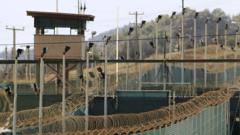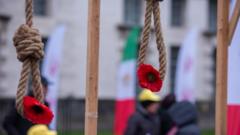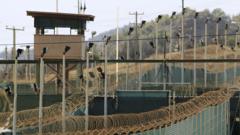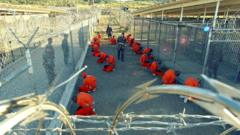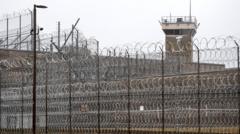The U.S. government's objection has yet again postponed the guilty pleas of 9/11 mastermind Khalid Sheikh Mohammed and his co-defendants. The court awaits further deliberation, emphasizing the importance of the case while families of victims express frustration.
9/11 Plea Deal Uncertainties: Federal Court Delays Guilty Pleas of Accused Terrorists

9/11 Plea Deal Uncertainties: Federal Court Delays Guilty Pleas of Accused Terrorists
A U.S. federal court has paused the guilty plea proceedings of Khalid Sheikh Mohammed and co-defendants due to government objections regarding their plea agreements.
In a significant turn of events, a federal appeals court has temporarily halted the guilty plea proceedings of Khalid Sheikh Mohammed, the alleged mastermind behind the September 11 attacks, and his two co-defendants. This decision follows objections raised by the U.S. government regarding the terms of previously agreed pre-trial deals that would see the accused plead guilty in exchange for avoiding a death penalty trial.
The federal government filed a motion arguing that accepting the pleas would cause "irreparable harm" to both the government and the American populace. A three-judge panel has since indicated they require additional time to examine the case, clarifying that this suspension should not be interpreted as a judgment on the merits of the agreements.
These proceedings come in the wake of actions by Defense Secretary Lloyd Austin, who sought to revoke the plea agreements signed by a senior official appointed by him. The significance is heightened as almost 3,000 lives were claimed on that fateful day in 2001 when coordinated hijackings targeted the World Trade Center and the Pentagon.
The three accused have spent over two decades in U.S. custody, with pre-trial hearings extending beyond ten years. Central to the arguments is the contention that much of the evidence against the defendants has been compromised by the torture they allegedly endured while in CIA custody. Reports indicate that Mohammed was subjected to simulated drowning techniques known as "waterboarding" 183 times, alongside other controversial interrogation practices.
While some families of 9/11 victims criticize the plea deals for their perceived leniency and lack of transparency, others contend that they could finally provide a pathway toward resolution of the protracted legal saga. Following the announcement of the delay, Tom Resta, a family member of victims, voiced disillusionment, stating, "The US government failed the 9/11 families again."
U.S. authorities maintain that proceeding with these deals would preclude them from pursuing capital punishment in what they describe as an unforgivable act of mass murder that devastated the nation and the globe. Mohammed's defense team argued that these agreements could offer much-needed closure after nearly 25 years of turmoil, indicating that the White House had been involved in the negotiations.
The federal court's recent decision aims to secure adequate time for the judges to receive comprehensive briefings and arguments swiftly. Now, the implications of this delay will be affected by the incoming Trump administration. If the plea agreements are ultimately affirmed, the next phase will involve appointing a military jury to assess evidence during a sentencing hearing, which would also permit victims’ families to address Mohammed and ask him questions directly.
The federal government filed a motion arguing that accepting the pleas would cause "irreparable harm" to both the government and the American populace. A three-judge panel has since indicated they require additional time to examine the case, clarifying that this suspension should not be interpreted as a judgment on the merits of the agreements.
These proceedings come in the wake of actions by Defense Secretary Lloyd Austin, who sought to revoke the plea agreements signed by a senior official appointed by him. The significance is heightened as almost 3,000 lives were claimed on that fateful day in 2001 when coordinated hijackings targeted the World Trade Center and the Pentagon.
The three accused have spent over two decades in U.S. custody, with pre-trial hearings extending beyond ten years. Central to the arguments is the contention that much of the evidence against the defendants has been compromised by the torture they allegedly endured while in CIA custody. Reports indicate that Mohammed was subjected to simulated drowning techniques known as "waterboarding" 183 times, alongside other controversial interrogation practices.
While some families of 9/11 victims criticize the plea deals for their perceived leniency and lack of transparency, others contend that they could finally provide a pathway toward resolution of the protracted legal saga. Following the announcement of the delay, Tom Resta, a family member of victims, voiced disillusionment, stating, "The US government failed the 9/11 families again."
U.S. authorities maintain that proceeding with these deals would preclude them from pursuing capital punishment in what they describe as an unforgivable act of mass murder that devastated the nation and the globe. Mohammed's defense team argued that these agreements could offer much-needed closure after nearly 25 years of turmoil, indicating that the White House had been involved in the negotiations.
The federal court's recent decision aims to secure adequate time for the judges to receive comprehensive briefings and arguments swiftly. Now, the implications of this delay will be affected by the incoming Trump administration. If the plea agreements are ultimately affirmed, the next phase will involve appointing a military jury to assess evidence during a sentencing hearing, which would also permit victims’ families to address Mohammed and ask him questions directly.











